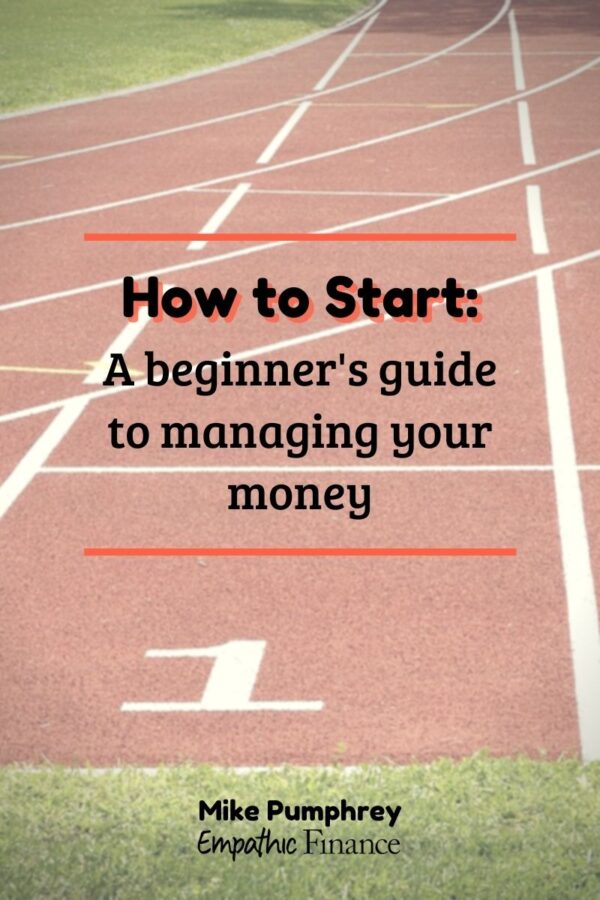An overview of the first steps on the path to financial wellness, aimed at those who are just getting started.
Recently, I was asked about what to do if you’re just getting started thinking about working on your finances. This was someone who was new to budgeting and who wanted to manage her debt.
Now, these are topics I’ve discussed for years now on this blog, but it occurred to me that I never quite had a primer on getting started from the beginning.
So this post is financial wellness “from the beginning”. Tips and tasks for when you’re just getting started.
Because we all have to start somewhere.

Table of Contents
Spending
First, let’s talk about spending money, because no matter where you are on your financial journey, you’re going to be doing that.
It might seem a little too basic at first, but it’s worth spending time on discussing how to spend money. As in, what methods of payment do you use? Do you use your debit card for everything? Do you pay cash?
I caution people who are just starting out to not use credit cards for every day spending. There are lots of reasons for this, but the simplest one to explain is that credit cards allow you to separate the purchasing of something from the spending money on something, with potentially dangerous consequences if you don’t have the money to pay for something.
I love airline miles as much as the next person (okay, probably more) but if you want to gain a greater picture into your financial situation, paying with real money (debit or cash) is the way to go.
Which leads me to…
Tracking
Track or you will fail. Whether it’s weight loss, steps walked, or money, it’s as simple as that.
I’ve long said that there is a secret life of your money. Meaning, that if you don’t keep good tabs on what your money is doing, it’s going to do what it wants to it, not what you want it to do.
It sounds crazy (since of course you’re always doing the spending), but it’s very easy to get in the habit of “unintentional” spending that you don’t even notice, and wouldn’t notice if it didn’t happen.
And it’s more important to spend intentionally, on what you really want and value and love, than it is to spend “less”.
In general, I want you to do the tracking, not your bank’s website or some app. The reason is the same as why schools recommend taking notes rather than just grabbing a handout from the professor: when you do the work, you feel it, and it sinks in much more effectively.
Sites like You Need a Budget are fine, but they can’t do anything that you can’t do yourself.
Budgeting
Tracking is one aspect of the larger process of budgeting.
Most people get this wrong. They start out with some boilerplate budget containing what they “should” be spending and then try and adapt their spending to that.
This never works. Your budget is your own. Your guidelines, your desires, what’s important to you, are all unique to you. Someone else’s budget won’t work.
Which is why I always say that people should track what they spend first, before making any changes. Once you have a picture of what you spend, you can decide whether it’s in line with your goals and values and only then make changes.
I recommend people divide their money into Income, Bills, and Expenses. A budget is best done on a monthly basis, so think in terms of everything that happens in a given month, knowing of course that every month is going to be slightly different.
I came up with some tips on how to succeed at your first month of budgeting,
because let’s be honest, keeping track of expenses is hard!
Debt
Most people have some form of debt. Student loans, car loans, credit cards, mortgages.
Debt is not “good” or “bad”. Debt is a drag on your ability to build wealth. Paying interest on debt is like investing at a negative interest rate. Therefore, paying off debt is like getting a positive return on all the money you didn’t spend on interest!
So make a plan to get out of debt. I prefer the Debt Snowball method, where you pay off debts from smallest to largest.
But before you can pay off debt, you need to stop accruing more. Otherwise, it’s like trying to dig your way out of a hole. It doesn’t work!
Dreaming
Most of this work is hard, and not a lot of it is fun. So ask yourself, why are you doing this?
Don’t just work on your financial situation because “you should”. That won’t keep you going through the hard times.
Instead, a core component of your financial wellness is dreaming. What does being wealthy look like to you? What would make you feel financially secure? What would you do if you didn’t have to work? If you could spend money on anything, what would it be?
Get specific. Really drill down into those dreams. The more excited you are, the better success you’ll have.
There’s of course so much more to the story than just this, but this is the best place to start. Once you have better visibility into your spending, tracking, budgeting, and your dreams, you’ll be well on your way to feeling financially secure.
For more tips, make sure to subscribe to my mailing list. And check out my YouTube channel too while you’re at it!


